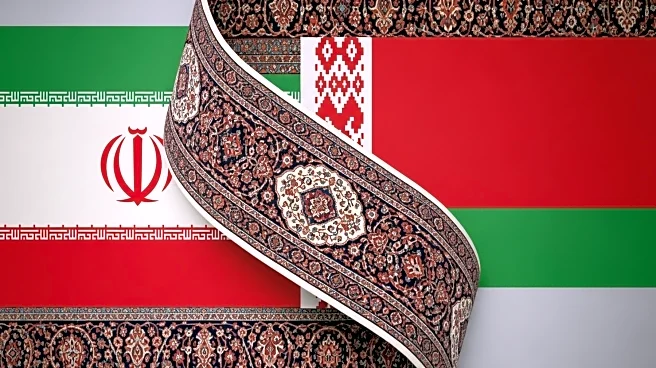What is the story about?
What's Happening?
Iran and Belarus have signed 12 cooperation documents during a visit by Iranian President Masoud Pezeshkian to Belarus, marking a significant step in their bilateral relations. The agreements cover various sectors including politics, tourism, media, investment, and special economic and industrial zones. This visit follows a series of high-level exchanges between the two nations, including a March 2023 visit by Belarusian President Alyaksandr Lukashenka to Tehran. The two countries have been enhancing their cooperation in scientific and technical fields, such as medicine, microbiology, nanotechnology, and energy. They have also established permanent trade offices to reduce reliance on the U.S. dollar and increase the use of local currencies. The relationship is rooted in a strategic cooperation agreement from 2007, which provided Belarus access to Iranian oil and Tehran benefited from Minsk's nuclear expertise.
Why It's Important?
The strengthening of ties between Iran and Belarus is significant in the context of their shared geopolitical challenges and their efforts to counter Western influence. Both countries have faced economic and political pressure from the West, which has driven them to seek closer cooperation. Their alignment is further reinforced by their participation in multilateral organizations like the Shanghai Cooperation Organization and BRICS, which support their vision of a multipolar world order. The collaboration between Iran and Belarus also includes military cooperation, with recent agreements on defense and potential manufacturing of drones. This partnership could impact regional security dynamics, especially given Belarus's proximity to Ukraine and Iran's involvement in supplying drones to Russia.
What's Next?
The relationship between Iran and Belarus is expected to continue growing, with further engagement in political and economic spheres. Their cooperation within organizations like the SCO and BRICS, along with their close ties to Russia, will likely serve as a catalyst for deeper bilateral relations. The emphasis on a multipolar world order and their shared enmity with the West will continue to drive their partnership. Future developments may include expanded trade agreements and increased military collaboration, potentially affecting regional stability and international relations.
Beyond the Headlines
The partnership between Iran and Belarus highlights the shifting alliances in global politics, where countries facing Western sanctions are increasingly looking towards each other for support. This alignment reflects a broader trend of countries seeking to diversify their international relations and reduce dependency on Western economies. The cooperation also underscores the strategic importance of multilateral organizations like BRICS and the SCO in facilitating these alliances. As these relationships evolve, they may contribute to a reconfiguration of global power dynamics, challenging traditional Western dominance.
















